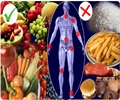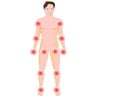The study unveils how tryptophan, typically a beneficial force in the body, transforms into a pathway leading to inflammatory diseases like rheumatoid arthritis.

Microbiota-dependent indole production stimulates the development of collagen-induced arthritis in mice
Go to source). The research was co-authored by Kristine Kuhn, MD, PhD, Scoville Endowed Chair and head of the CU Division of Rheumatology. Several of her division colleagues collaborated on the paper, which was published in February in the Journal of Clinical Investigation.
What is Tryptophan?
Tryptophan is an essential amino acid found in many protein-rich foods, including meats, fish, dairy products, and certain seeds and nuts. It has many uses in the body, including helping in the production of proteins, muscles, enzymes, and neurotransmitters – the nervous system’s chemical messengers. The body doesn’t make it; we get it from our diet.‘Inhibiting the generation of indole could offer a distinctive therapeutic approach for rheumatoid arthritis and spondyloarthritis. #arthritis #tryptophan ’





Many people think of tryptophan as the ingredient in turkey that supposedly makes us sleepy after a Thanksgiving feast. In fact, researchers say that although tryptophan plays a role in helping to regulate the sleep cycle, the amount that’s in turkey probably isn’t a significant cause of post-dinner drowsiness. Kuhn and her associates set out to learn how a substance that often is a force for good in the body is converted into a pathway to inflammatory diseases such as rheumatoid arthritis, which affects about 1% of the population. It can cause painful swelling of the hands and feet, and joint deformities if left untreated.
"It’s been known that the microbiome – the bacteria in our gut – can break down tryptophan into byproducts. Some of those byproducts are anti-inflammatory, but we’ve also associated some inflammatory causes of those products,” Kuhn says. “We’re the first to highlight which products are contributing to inflammation, and how they are doing that.”
She says the new research “builds upon some observations we had in patients with spondyloarthritis – not quite rheumatoid arthritis, but a closely related condition – where we found that changes in the microbiome were associated with increased production of these products called indoles, which are what bacteria make from tryptophan.” Similar changes were observed in arthritis studies involving mice, she says.
Did You Know?
A Mediterranean diet with plant-based fibers and lean meats promotes a healthier microbiome, providing anti-inflammatory tryptophan benefits compared to a typical Western diet.
Advertisement
“If tryptophan hits our body’s cells, it tends to go get broken down into anti-inflammatory products versus when it hits the bacterial cells and goes more inflammatory. The ways we think about how this could lead to therapies are: How do you keep that balance tipped so that tryptophan goes towards that anti-inflammatory pathway? How can you manipulate intestinal bacteria to tip that balance? That's where we’re interested in going in the future.”
Advertisement
Reference:
- Microbiota-dependent indole production stimulates the development of collagen-induced arthritis in mice - (https://www.jci.org/articles/view/167671)
Source-Eurekalert















